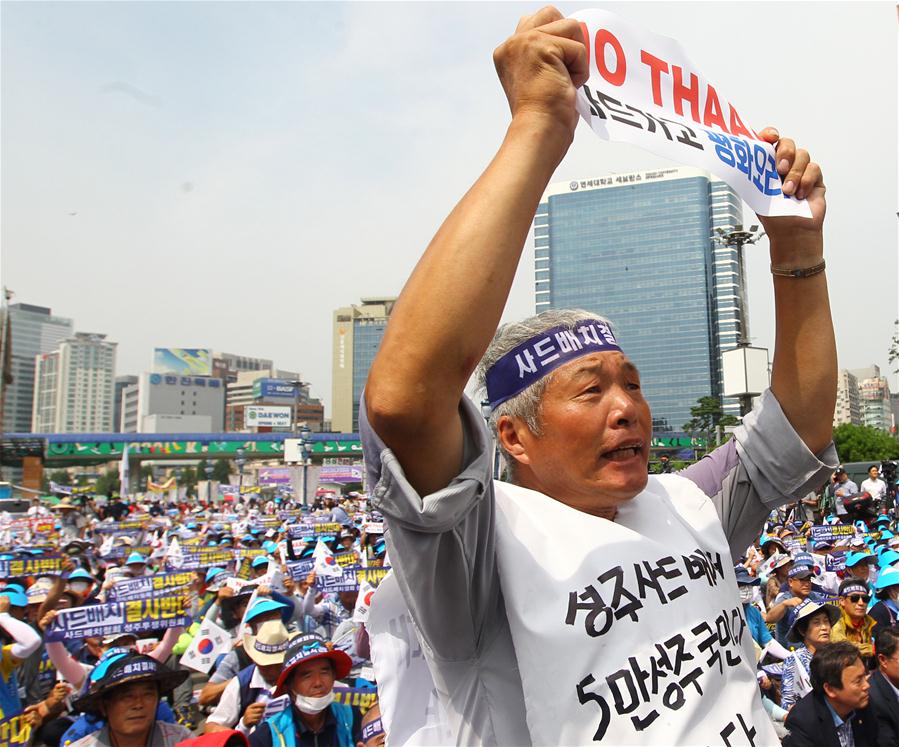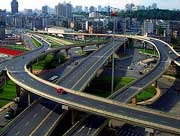


A man from Seongju county holds a banner to protest against the deployment of the Terminal High Altitude Area Defense (THAAD), during a rally in Seoul, capital of South Korea, on July 21, 2016. More than 2,000 people from Seongju county, where one THAAD battery will be deployed, gathered at a square in Seoul for a rally on Thursday, to protest against the deployment of THAAD. (Xinhua/Yao Qilin)
SEOUL, July 29 -- South Korean citizens, politicians and news organizations are raising a dissenting voice over the decision between Seoul and Washington to deploy Terminal High Altitude Area Defense (THAAD) in their homeland.
Villagers living in the site where one THAAD battery is scheduled to be installed by the end of next year continue their protest against the U.S. missile defense system, while civic group activists and student groups who advocate peace and stability rally against the U.S. weapons program.
Opposition lawmakers call for the retraction of the THAAD deployment decision, and in several TV programs, panelists are divided over pros and cons of the installation, which reflects the nationwide split between people over the untested, environmentally hazardous U.S. anti-missile system.
Park Wan-joo, first vice floor leader of the main opposition Minjoo Party, told a party meeting on Thursday that the THAAD deployment raised risks of easing isolation of the Democratic People's Republic of Korea (DPRK), asking to form a special parliamentary committee to discuss countermeasures against possible negative effects.
Following the DPRK's fourth nuclear test in January and its launch in February of a long-range rocket, which was condemned as a disguised test of ballistic missile technology, the international community adopted tougher-than-ever UN Security Council resolutions.
The agreed-upon THAAD installation raised concerns here about difficulties that South Korea could face in winning cooperation from China and Russiato achieve the goal of denuclearizing the Korean peninsula. China and Russia have expressed strong oppositions to the deployment as it breaks regional strategic balance and damages security interests of the neighbors.
THAAD's X-band radar can spot Chinese and Russian territories as the forward-based mode radar has a detectable range of at least 2,000 km. Seoul has claimed that it would introduce a terminal mode radar with a coverage of 600-800 km, but it can converted at any time into the forward-based mode as the two use the same hardware.
The modified version even doesn't need any conversion, according to a local media report. Local newspaper Hankyoreh reported that the AN/TPY-2 radar can range 3,000-4,000 km, citing Massachusetts Institute of Technology (MIT) emeritus professor Theodore Postol. It confirmed Chinese and Russian worries about the damaging of security interests.
Moon Jae-in, former Minjoo Party leader and presidential candidate during the 2012 presidential election, said in his Facebookaccount that the THAAD deployment would cause more losses than gains and that the Park Geun-hye government's adherence to the U.S. anti-missile system endangered international coordination in resolving the peninsula's nuclear issue.
Minority political parties more strongly express their objections to THAAD, while liberal activists and peace advocates voiced dissents almost every day from different places nationwide. Panelists appear in TV discussion programs, raising awareness among ordinary people over why THAAD is useless for the protection of South Korean people.
Public opinion is changing into more objections to the THAAD deployment. According to a survey of 1,000 adults conducted by local newspaper Media Today between July 21 and 22, 53.1 percent demanded re-negotiation of the deployment decision. Calls for the installation as planned took up 42.6 percent of the respondents.
Younger generations overwhelmingly objected to the THAAD deployment, with 78.3 percent of those in their 30s expressing opposition. The dissenting figures for those in their 20s and 40s were 66.7 percent and 63.1 percent respectively.
It was in contrast to the Realmeter's February poll that showed 49.4 percent in favor of and 42.3 percent against the THAAD deployment. The growing awareness about what THAAD is helped more people change positions, but older generations, especially those aged over 60, remain in favor of it as the government hypes up public fears.
The government has claimed that without the THAAD battery, South Korea will fall victim to growing nuclear and missile threats from Pyongyang. Dissenters express worry about the belief that THAAD could be a cure-all to protect from DPRK missiles.
THAAD is designed to shoot down missiles at a relatively high altitude of 40-150 km using a hit-to-kill technology, while DPRK missiles can travel at a lower altitude of 20-30 km. There is no reason for Pyongyang to propel its short- and medium-range missiles high in the sky in times of emergency with Seoul and Washington. About 28,500 U.S. troops are stationed in South Korean soil.
"Without THAAD, there are enough military assets of (South) Korea-U.S. alliance to defend against North Korea (DPRK)'s missile threats," said Cheong Wook-sik, director of Peace Network and co-chair of steering committee of Civil Peace Forum during a press conference with foreign correspondents.
Cheong called for Seoul's dialogue with Pyongyang and its retraction of the THAAD deployment decision, saying fears for the DPRK's nuclear weapons would disappear with improved inter-Korean relations like South Korean people having no fear for the U.S. nuclear weapons thanks to the bilateral alliance.
College student activists took to the street to hold rallies against THAAD. One of the student dissenters told Xinhua earlier this week that relevant parties should return to dialogue to ease tensions and reduce war risks in the Northeast Asian region.
"If denuclearization (on the Korean peninsula) is an ultimate goal, (South Korea) should select dialogue rather than THAAD deployment, which will make dialogue much harder. Blocking the THAAD deployment can be a first step toward dialogue," said Lee Jowoon, 24, who declined to be identified further.
Residents living in Seongju county, where the THAAD battery will be deployed, continue their protests against it. Two weeks earlier, Seongju villagers threw water bottles and eggs at Prime Minister Hwang Kyo-ahn and Defense Minister Han Min-koo who visited the country, some 250 km southeast of Seoul, to appease angry people.
The residents, mostly farmers, were infuriated at the deployment of hazardous radar without any prior notice and discussion. The THAAD radar is known to emit super-strong microwave detrimental to human body. It can also cause an environment hazard, boosting worries among villagers about the oriental melon farming, the economic mainstay of the county.
According to local news agency Newsis, Seongju residents plan to show a performance of plowing up a melon field on Saturday to protest against the THAAD deployment. Tonsure and candlelight rallies have been held, and will be done, continuously in the county in protest against the deployment.
Day|Week

 Who Will Fit The Chinese Roles In Game Of Thrones?
Who Will Fit The Chinese Roles In Game Of Thrones? China's Hubei Shennongjia added to World Heritage List
China's Hubei Shennongjia added to World Heritage List Cute Dog At Fruit Stand Becomes Latest Internet Sensation
Cute Dog At Fruit Stand Becomes Latest Internet Sensation Thai most beautiful transgender Nong Poy release new photos
Thai most beautiful transgender Nong Poy release new photos Top 10 livable Chinese cities
Top 10 livable Chinese cities The last primitive tribe in China
The last primitive tribe in China China's first intelligent security robot debuts in Chongqing
China's first intelligent security robot debuts in Chongqing A Total of 3,552 Subscribers Vanish In Two Days; YouTube Closes All Doors to Users’ Inquiries
A Total of 3,552 Subscribers Vanish In Two Days; YouTube Closes All Doors to Users’ Inquiries Out of this world! Futuristic UFO-shaped yacht has its own garden and a stunning underwater viewing deck
Out of this world! Futuristic UFO-shaped yacht has its own garden and a stunning underwater viewing deck An old tea house in Chengdu
An old tea house in Chengdu